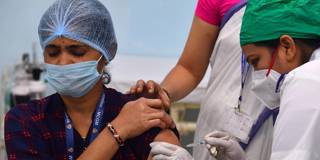 INDRANIL MUKHERJEE/AFP via Getty Images
INDRANIL MUKHERJEE/AFP via Getty Images
抗疫需要什么
日内瓦—作为世界卫生组织总干事委任的2019冠状病毒病特使,我们亲眼目睹了疫情带来的痛苦,在贫困地区尤为严重。这些可怕的悲剧在我们眼前愈演愈烈,远未结束。
一旦出现传染性疾病,首要任务往往是拯救生命和保护今世后代的健康和福祉。与此同时,我们愈加担心2019冠状病毒病所造成的巨大社会经济损失,疫情依旧肆虐,全球人民苦于维持生计,显然,这次疫情不止是一次卫生紧急事件,而是一场全球性社会危机。
因此,我们最担心的是,几十年来全球经济持续进步,但一场疫情给未来几代人的经济发展蒙上阴影。部分地区经济状况倒退了20年,在提高就业、扩大基本服务和改善教育(特别是女童教育)等方面取得的成就均受到新冠的威胁,基础设施、水资源和卫生设施、疾病控制、政治稳定和治理机构的改善也同样岌岌可危。
https://prosyn.org/VORJAfAzh
To continue reading, register now. It’s free!
Register Now
Already have an account?
Log in



日内瓦—作为世界卫生组织总干事委任的2019冠状病毒病特使,我们亲眼目睹了疫情带来的痛苦,在贫困地区尤为严重。这些可怕的悲剧在我们眼前愈演愈烈,远未结束。
一旦出现传染性疾病,首要任务往往是拯救生命和保护今世后代的健康和福祉。与此同时,我们愈加担心2019冠状病毒病所造成的巨大社会经济损失,疫情依旧肆虐,全球人民苦于维持生计,显然,这次疫情不止是一次卫生紧急事件,而是一场全球性社会危机。
因此,我们最担心的是,几十年来全球经济持续进步,但一场疫情给未来几代人的经济发展蒙上阴影。部分地区经济状况倒退了20年,在提高就业、扩大基本服务和改善教育(特别是女童教育)等方面取得的成就均受到新冠的威胁,基础设施、水资源和卫生设施、疾病控制、政治稳定和治理机构的改善也同样岌岌可危。